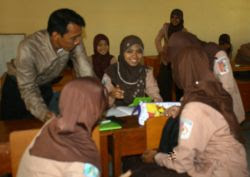Kompetensi Dasar Bahasa Inggris Muatan Nasional:
3.13. Menganalisis fungsi sosial, struktur teks, dan unsur kebahasaan teks interaksi transaksional lisan dan tulis yang melibatkan tindakan memberi dan meminta informasi terkait saran dan tawaran, sesuai dengan konteks penggunaannya. (Perhatikan unsur kebahasaan should, can)
4.13. Menyusun teks interaksi transaksional, lisan dan tulis, pendek dan sederhana, yang melibatkan tindakan memberi dan meminta informasi terkait saran dan tawaran, dengan memperhatikan fungsi sosial, struktur teks, dan unsur kebahasaan yang benar dan sesuai konteks.

I
n daily occasions, we often come across situations in which it is necessary for us to ask for and make suggestions to a family member, relative, friend, and/or colleague. People need suggestions when they have no idea of what to do. In this post, we are going to learn how to ask for a suggestion or advice, how to give a suggestion or advice, how to make a suggestion or advice, and how to respond to a suggestion or advice in English. Study the following expressions.
Expressions used to ask for and give advice and suggestions
| Asking for Advice and Suggestions | Giving Advice and Suggestions |
- Do you think I ought to .........?
- Do you have any idea about how I can ...?
- What do you think I should .........?
- Should I try to .........?
- If you were in my shoes, would you .........?
- If you were in my situation, how would you .........?
- Can you give me some advice about ...?
- What / how do you suggest .........?
- What do you recommend .........?
- Do you have any recommendations about .........?
- Can you recommend .........?
|
- (I’d say that) You’d better .........
- If I were you, I would .........
- If I were in your shoes, I would .........
- If I were in your situation, I would .........
- It would probably a good idea to .........
- Why don’t you .........?
- How about .........?
- Maybe you should .........
- I advise you to .........
- My advice is to .........
- I suggest that we / you .........
- Let me suggest that we / you .........
- I recommend that you .........
- My recommendation is that we / you ..........
|
Expressions used to respond to advice and suggestions
| Agreeing | Disagreeing |
- I agree with you.
- I think you're right.
- I couldn't agree more.
- I think so.
- That's a good idea.
- That's right.
- Thanks. I'll take your advice.
- That sounds great.
|
- No, I don't think so.
- I disagree with you.
- That's not a good idea.
- I understand your point, but I think ....
|
Exercise: Asking for, giving, and responding to suggestions
Complete the following short dialogues.
| 1 | Woman:
(asks for a suggestion) | "......... to the party tonight?" |
| Man:
(gives a suggestion) | "You’d better wear the dress that you wore to the prom last month. It looks good on you." |
| Woman:
(agrees) | ".........." |
| 2 | Woman:
(complains) | "I have a bad headache." |
| Man:
(gives a suggestion) | ".........." |
| Woman: (agrees) | "........." |
| 3 | Woman:
(asks for a suggestion) | "I want to eat out this evening. .........?" |
| Man:
(gives a suggestion) | ".........." |
| Woman:
(agrees) | ".........." |
To do more exercises on "How to ask for suggestions, give suggestions, respond to suggestions", please
proceed to the exercise page.Also check our latest post containing a video material complete with exercises
HERE.
Updated Thu, 4th Feb, 2021 7:50 A.M.









